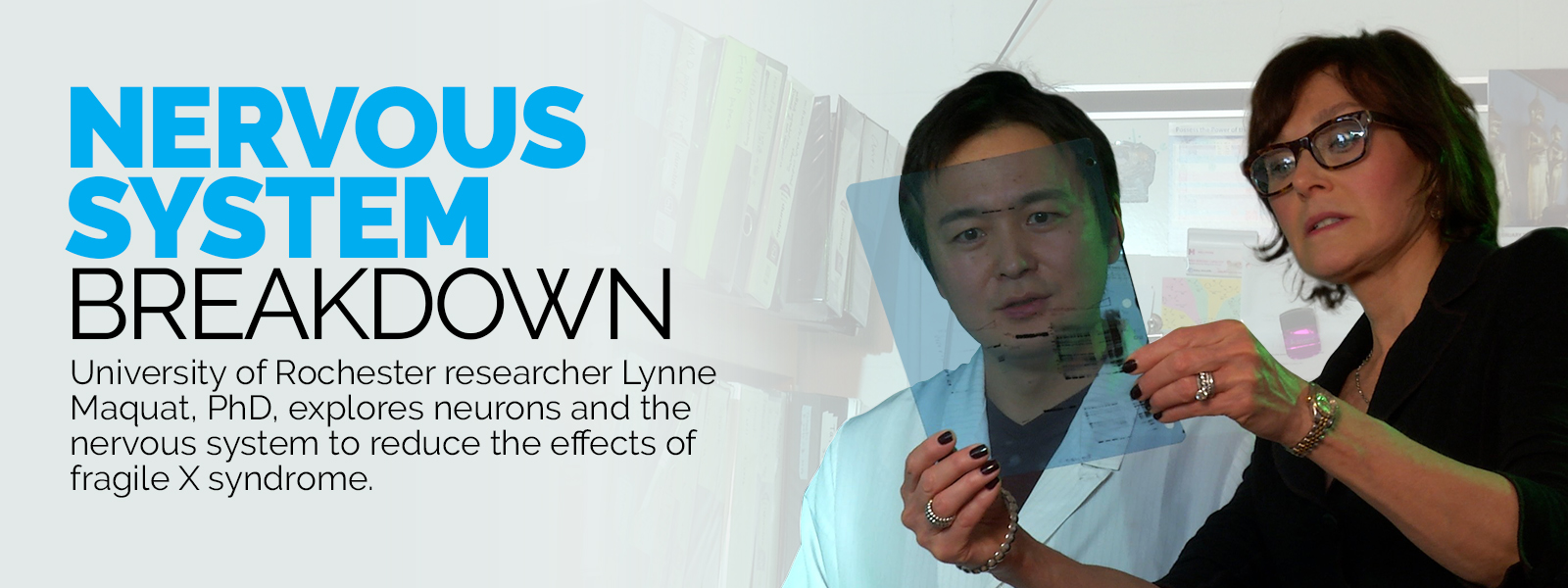
“The occurrence and development of events by chance in a happy or beneficial way”
That’s how Lynne E. Maquat, PhD, describes the process of how her research extended to Fragile X syndrome to better understand it and ultimately find advanced treatments.
“As a card-carrying biochemist/molecular biologist, most of my 35-plus year career has been spent discovering the causes of inherited human diseases,” said Dr. Maquat, J. Lowell Orbison Endowed Chair and Professor, Department of Biochemistry and Biophysics, School of Medicine and Dentistry, and Director, University of Rochester Center for RNA Biology. “While studying one disease and simultaneously obtaining results pertinent to Fragile X syndrome, together with knowing there is no cure for Fragile X syndrome, my lab jumped at the chance to make a difference.”
Breaking Down Neurons
In Fragile X syndrome, neurons don’t mature properly.
This leads to the failure of the nervous system to effectively transmit information. Reasons remain unclear, but one laboratory has solid evidence the stability of many messenger RNAs — the molecules that produce proteins in our cells — is abnormal.
“We believe these abnormalities contribute to the development of Fragile X.”
Controlling NMD Is Key in Fragile X
Nonsense-mediated decay (NMD) plays an important role in Fragile X, as well as many other genetic syndromes. NMD is a “housekeeping” process that protects cells from mistakes they often make when expressing genetic material. It is used by cells to help them adapt when growth conditions change.
“We’ve found NMD is hyper-activated in Fragile X syndrome,” said Dr. Maquat, who earned a BA in Biology at the University of Connecticut and a PhD in Biochemistry at the University of Wisconsin-Madison. “NMD is working overtime, and this extra activity could be detrimental to cells in the brain.”
Can Approved Drugs Help?
The good news is there are approved drugs on the market that inhibit NMD.
But in order to match an appropriate drug with the needs of Fragile X patients, researchers need to understand the specific molecular defects that lead to Fragile X.
“Drugs target molecules in our cells, so once we know the molecular cause of Fragile X and how exactly NMD plays a role we can pick or develop a drug that targets that particular process,” Dr. Maquat said.
The goal is to identify drugs that are likely to be more effective and have fewer side effects because they target a particular mechanism. Although her lab has not yet tested approved drugs on patients with Fragile X, researchers have used human kidney cells, which are easier to work with than neurons, to recapitulate Fragile X syndrome and understand how NMD is in over-drive.
“This is one approach to precision medicine, and we want to use this approach to tackle Fragile X,” she said. “I believe we are the only lab studying Fragile X from the molecular perspective of NMD and messenger RNA stability. Moving forward, we plan to use skin cells from Fragile X patients and brains cells from individuals without the disease that we can engineer to behave like neurons from Fragile X patients.”
FRAXA Support Is Critical for Fragile X Research
Dr. Maquat said her biggest obstacles are financial.
It is very expensive to develop the proper cells to study Fragile X syndrome and her lab could not have gotten as far without funding.
“We are extremely grateful to the FRAXA Research Foundation,” Maquat said. “FRAXA’s support has been essential to our work. Without FRAXA funding, my lab would not be pursuing research on Fragile X, which is desperately needed. Though the work in my lab is considered basic science, our ultimate goal is to help people. It’s only through funding from FRAXA and other organizations that we can bring new treatments to patients who need them.”

